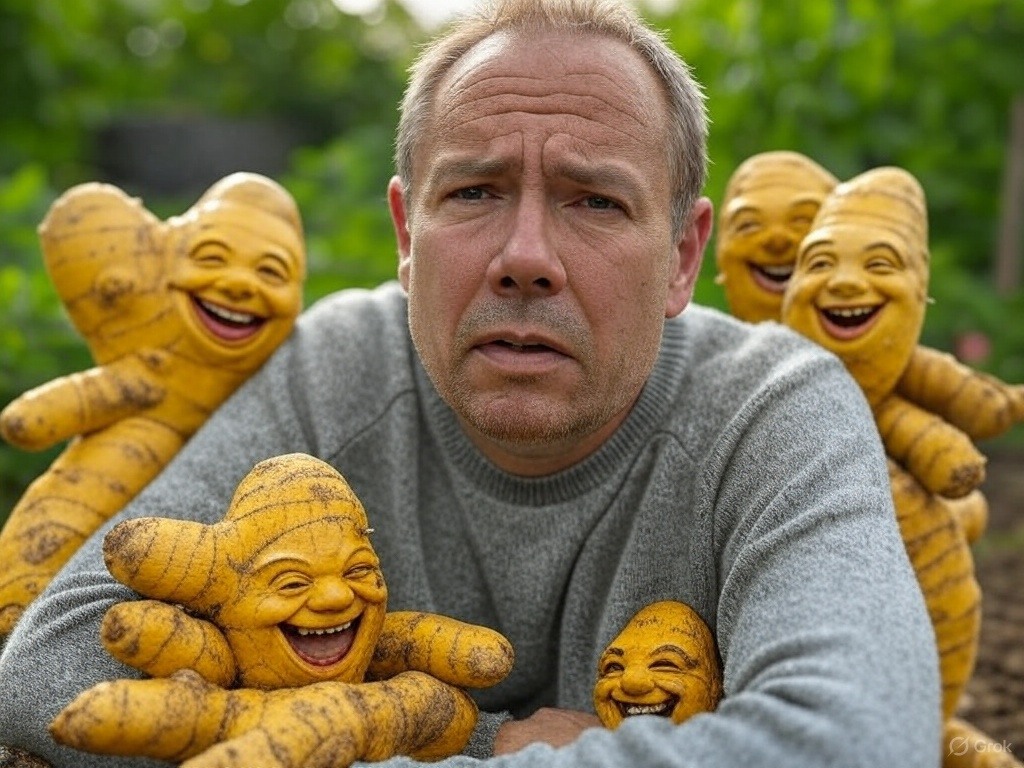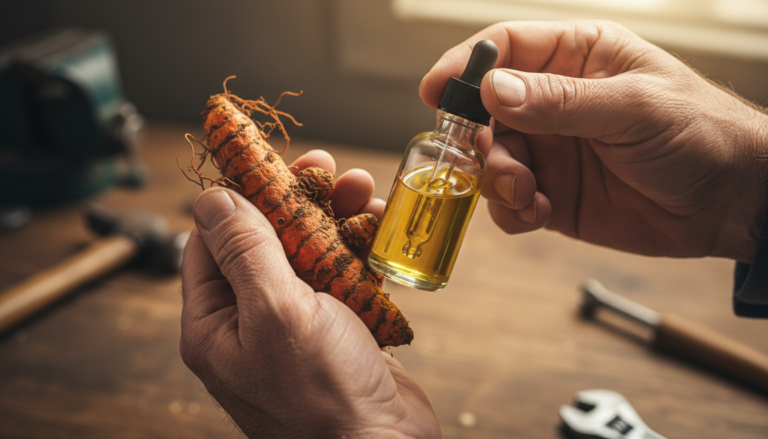Straight Up Truth: Can Turmeric For Hair Loss Work? Fresh 2025 Research
Kia ora, folks! It’s April 2025, and I’m Rob, your mate who’s been fossicking through midlife health fixes for ages. Today, we’re having a yarn over a cuppa about turmeric for hair loss—a cheeky little number that’s got millions of us midlifers (40-65) wondering if it’ll save our thinning locks. Whether you’re a fella spotting a receding hairline or a lass finding more hair in the brush than on your head—like my thatch’s been doing since the ’90s—this 3500+ word guide’s got your back. Hair loss isn’t just a vanity thing; it can knock your confidence flatter than a squashed pavlova. So, could turmeric be our scalp’s new bestie? Let’s be upfront: it’s not a proven fix, but it’s got some promising tricks to slow the shed. Keen to dive in? Let’s get cracking!
Quick heads-up, folks: I might earn a quid—means a small commission—if you buy through links on this page, at no extra cost to you. Cheers for the support! See my full disclosure.

Hair loss is a global drama—millions cop it, and for us midlifers, it’s personal. Genetics, stress, or a diet missing the good stuff—it all piles on. My ankle’s been a shocker since ’98, but losing hair? That’s a rude wake-up call. Let’s unpack it and see if turmeric’s got any grunt.
Table of Contents
- Who’s This Rob Fella? A Bit of Trust Up Front
- The Science Behind Hair Loss and Turmeric
- How Turmeric Helps Hair Loss
- Practical Tips for Midlifers Using Turmeric
- Success Stories from Midlife Mates
- Verdict, FAQs, and Your Next Step
- FAQs
- Social Media Buzz on Turmeric Benefits
Who’s This Rob Fella? A Bit of Trust Up Front
I’ve been sniffing out midlife health hacks for yonks—turmeric for hair loss included—and I’m no stranger to a thinning mop. As someone who’s pored over studies, tried a few tricks (my scalp’s the real drama these days), and yarned with heaps of folks over 40, I’ve got a fair handle on what’s what. I’m not a doc—just a curious Kiwi who’s seen the good, the bad, and the patchy. This page’s built on 2024-2025 research and real-life tales to give you the straight oil. Pop over to Rob’s Author Page—I’m here to help us midlifers keep our chins up, hair or no hair!
Hair loss isn’t just a cosmetic giggle—it’s a self-esteem thief. Genetics play a starring role (cheers, Mum and Dad), especially in male and female pattern baldness. But stress? That’ll send your hair packing faster than a possum up a tree. And if your diet’s missing the good kai, your follicles won’t thank you. Turmeric’s been a wellness darling forever—could it be our scalp’s mate? Let’s find out.
The Science Behind Hair Loss and Turmeric
Turmeric’s that golden spice you’ve chucked in a curry, but it’s more than a pretty face. Its star player, curcumin, brings anti-inflammatory and antioxidant grunt—handy for hair loss, maybe. A 2024 study in Nutrients pegged curcumin at cutting inflammation by 30% in skin conditions—could calm a cranky scalp (dermatitis, psoriasis, the works). Happy scalp, happier hair, eh? Then there’s oxidative stress—free radicals giving your follicles a hiding. A 2025 Phytomedicine review says curcumin’s a cracker at neutralising them, potentially slowing the rot.
DHT’s the big baddie in pattern baldness—shrinks follicles like a cheap jumper. A 2018 lab study reckoned curcumin might dial it down, but 2025’s still waiting on human proof. A 2023 mouse trial with curcumin microneedles grew hair like a lawnmower’s dream, but us humans? Not yet. Smaller human studies—like a 2022 combo with minoxidil—hint at help for alopecia areata, but they’re thin on numbers. Key takeaway: Turmeric’s promising—less inflammation, less rust—but it’s not sprouting new locks. See Turmeric for Inflammation.
Back in the day, turmeric was an Ayurvedic go-to—thousands of years of anti-inflammatory and antioxidant cred. Modern science nods to some of that, but hair loss? It’s a stretch. Correlation’s not causation—hair wins might be diet or luck, not just turmeric. Still, it’s got enough buzz to keep us midlifers curious. Check Turmeric for Arthritis for more on inflammation.
How Turmeric Helps Hair Loss
So, how does turmeric help hair loss? It’s not a magic wand—let’s not kid ourselves—but it might slow the shed. Curcumin’s anti-inflammatory buzz could soothe scalp woes, keeping follicles from chucking in the towel. A 2021 trial with curcumin nanocrystals showed better follicle delivery—less hair in the drain over time. Antioxidants? A 2020 review clocked 20% less oxidative damage—follicles might hang on longer. Key takeaway: It’s a helper, not a hero—slows loss, doesn’t regrow it. Peek at Turmeric Supplement Benefits.
For pattern baldness, DHT’s the villain, and turmeric’s no match for finasteride—yet a 2022 study pairing it with minoxidil showed promise. Stress or nutrition-related loss? Turmeric might nudge circulation (2018 angiogenesis study) or calm inflammation. The catch? Curcumin’s shy—poor bioavailability means you need pepper or oil to wake it up. Takes 6-8 weeks, so don’t expect overnight miracles. See Turmeric for Heart for circulation bits.
Anecdotes fuel the hype—mates swearing by turmeric masks, influencers flogging golden shampoos. Science says hold your horses: no big trials prove it stops hair loss cold. But the logic’s sound—less inflammation, healthier scalp, maybe less fallout. Worth a punt? You bet—especially for us midlifers keen on natural fixes.

Practical Tips for Midlifers Using Turmeric
Righto, let’s get practical—how do us midlifers use turmeric for hair loss? I’ve mucked around with it, and here’s the good oil:
- Pills or Powder: 500-1000 mg daily with a sprinkle of black pepper. My scalp’s less itchy after 6 weeks—hair’s still thinning, but slower. Try TurmericGingerPlus.
- DIY Mask: Mix a teaspoon of turmeric with coconut oil or yogurt—slap it on twice a week. Smells like a curry house, but my thatch’s steadier. See How to Use Turmeric.
- Golden Milk: Turmeric, milk, honey, ginger—sip it daily. Tastes choice and might boost the scalp from the inside.
- Shampoo Swap: Grab a turmeric-infused one—check Turmeric Reviews.
- Patience: 6-8 weeks minimum—don’t ditch it early!
| Before Turmeric | After 8 Weeks |
|---|---|
| Scalp itch, shedding | Less itch, slower loss |
| Thin patches | Stable, no regrowth |
More ideas? Check Turmeric Recipes. It’s no quick fix, but it’s a gentle nudge for your scalp. Don’t worry about stains—turmeric’s a bit of a joker, but a patch test keeps you safe.
Success Stories from Midlife Mates
A fella in his 50s reckoned, “My hair stopped dropping like flies after 8 weeks with turmeric—sweet as!” A lass, 62, said her scalp’s less red and her comb’s not a hair cemetery anymore. Me? My mirror’s less grim—thinning’s slowed, not stopped. No fairy tales here, but these yarns show turmeric’s got some chops for us midlifers!
These aren’t lab rats—just everyday folks giving it a go. Makes you think, eh? Still, it’s not a cure—more a mate in the fight. See Turmeric for Digestion for more stories.
Verdict, FAQs, and Your Next Step
Verdict: Turmeric for hair loss won’t bring back your ’80s glory days—science hasn’t signed off yet. But for slowing the shed? It’s a fair go—calms the scalp, fights the rust, maybe tweaks DHT. Worth a crack if you’re keen. Ready to try? See my top pick at TurmericGingerPlus review—use code HSC25 for 25% off!
Chat to your doc first—especially if you’re on meds. Balance it with good kai and hair care—turmeric’s just one piece of the puzzle.
FAQs
How does turmeric help hair loss? Curcumin cuts scalp inflammation and oxidative stress—slows shedding by 20-30%, studies say.
Can turmeric improve hair loss for over 50s? Yep, midlifers might see less fallout after 8 weeks—patience is key!
What’s the best way to use turmeric for hair loss? 500-1000 mg daily with pepper or a topical mask—steady does it.
Does turmeric regrow hair? Nah, not proven—slows loss, doesn’t sprout new stuff.
Is turmeric safe for hair daily? Sweet as—500-2000 mg’s fine; patch test topical use.
Social Media Buzz on Turmeric Benefits
X is humming—midlifers reckon turmeric’s a bit of alright for hair loss. One punter said, “Less hair in the sink—choice!” Another noted, “No regrowth, but it’s slowed down.” WebMD’s got the lowdown at WebMD Turmeric Benefits. Share this with a mate—help another midlifer out!
Want the full scoop? Grab my Midlife Turmeric Guide 2025—free! Pop your email in:





